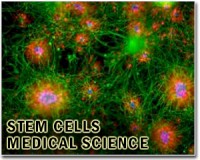 |
Washington (AFP) Dec 8, 2010 US scientists have used stem cell technology to create mice from two fathers, an advance that they say could help preserve endangered species and even help same-sex couples have their own genetic children one day. According to the study published Wednesday in the journal Biology of Reproduction, reproductive scientists in Texas were able to manipulate cells from a male (XY) mouse fetus to produce an induced pluripotent stem (iPS) cell line. These iPS cells are adult cells that have undergone some genetic reprogramming in order to enter an embryonic stem cell-like state. Some of the cells that were grown from this new line spontaneously lost their Y chromosome, turning them into XO cells. Those XO cells were injected into embryos from donor female mice and transplanted into surrogate mouse moms who gave birth to babies with one X chromosome from the original male mouse. Those babies grew and later mated with normal male mice. Their offspring, both male and female, showed genetic contributions from two fathers. The study was led by Richard R. Berhringer at the MD Anderson Cancer Center. Researchers said that with a variation of their technique, "it may also be possible to generate sperm from a female donor and produce viable male and female progeny with two mothers." However, the study cautioned that the ability to replicate the findings in humans was a long way off. The "generation of human iPS cells still requires significant refinements prior to their use for therapeutic purposes," the study said. Previous research has found ways to create mice without any fathers at all, as well as ways to create mice with two mothers.
Share This Article With Planet Earth
Related Links The Clone Age - Cloning, Stem Cells, Space Medicine
 Second stem cell trial approved by FDA
Second stem cell trial approved by FDAWashington (UPI) Nov 22, 2010 The second clinical trial using human embryonic stem cells has been approved by the U.S. Food and Drug Administration, the company conducting the trial said. Biotech company Advanced Cell Technology of Marlborough, Mass., said Monday it has received approval for testing retinal cells in patients with Stargardt's macular dystrophy, a rare disease that causes progressive vision loss in ch ... read more |
|
| The content herein, unless otherwise known to be public domain, are Copyright 1995-2010 - SpaceDaily. AFP and UPI Wire Stories are copyright Agence France-Presse and United Press International. ESA Portal Reports are copyright European Space Agency. All NASA sourced material is public domain. Additional copyrights may apply in whole or part to other bona fide parties. Advertising does not imply endorsement,agreement or approval of any opinions, statements or information provided by SpaceDaily on any Web page published or hosted by SpaceDaily. Privacy Statement |